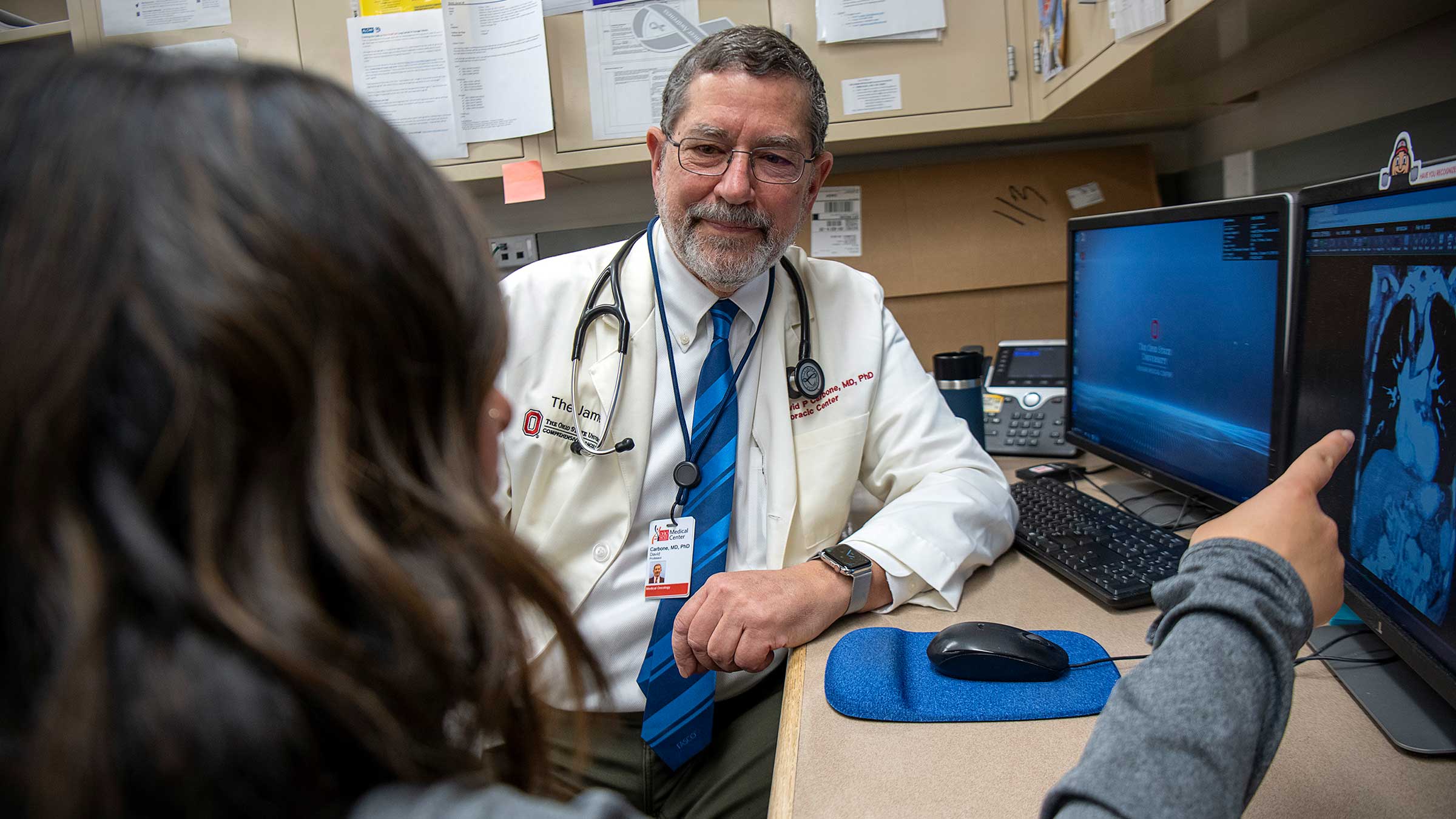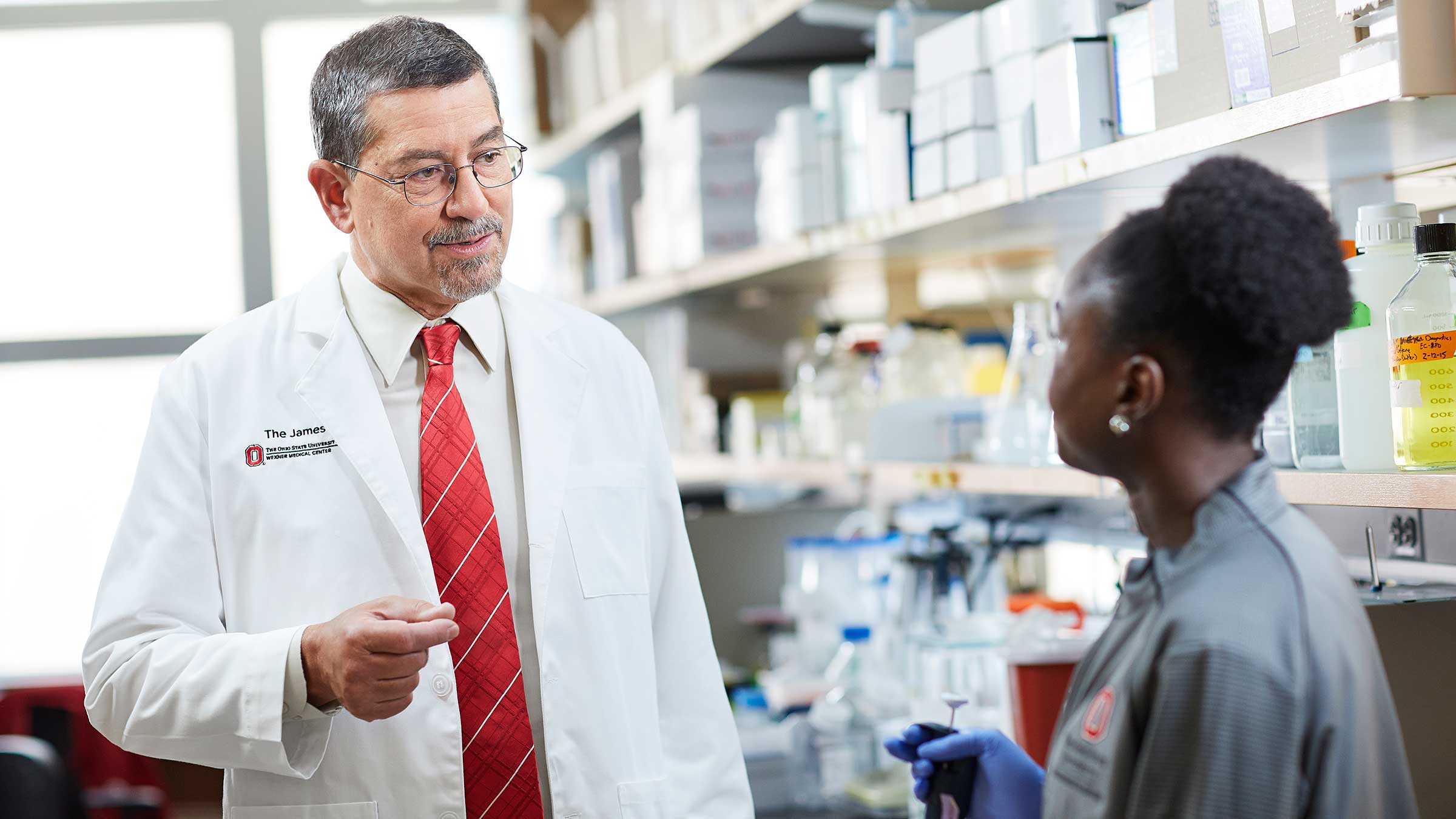‘The pace is exhilarating’: Advancements accelerate lung cancer treatment
A world-renowned lung cancer specialist continues developing research and clinical trials that hold promise to stop lung cancer.
At 69, David Carbone, MD, PhD, knows he could retire at any time, yet he’s the only one of his six siblings — all younger than he — who’s still working.
Why? Because through his decades of work, this distinguished lung cancer specialist still enjoys helping his team develop research-based therapies that offer increasing hope to patients living with lung cancer, the leading cause of cancer death among both men and women worldwide.
“I love seeing patients, on video calls or in the clinic, and I enjoy doing my best to find good science-based therapies to help them,” says Dr. Carbone, who in 2012 was recruited to The Ohio State University Comprehensive Cancer Center – Arthur G. James Cancer Hospital and Richard J. Solove Research Institute (OSUCCC – James) to establish and direct a Thoracic Oncology Center there.
“What gets me up and into work every morning is our incredible team of physicians, nurses and staff who work together to help our patients. It’s an amazing group,” Dr. Carbone says.
“It’s also amazing how far we’ve come in studying and treating lung cancer over the past few decades,” he adds. “We have a long way to go, but I’d say the pace of advance is exhilarating.”

Non-small cell lung cancer patient travels for Dr. Carbone’s care
Martha McCann Lesnick, a singer–songwriter from Nashville, Tennessee, has been under Dr. Carbone’s care since soon after her initial diagnosis with stage III non-small cell lung cancer (NSCLC) in 2006 — while he was working at the Martha Ingram Cancer Center at Vanderbilt University in Nashville.
“After surgery to remove my upper right lobe, I was referred to Dr. Carbone,” Lesnick says. “At that time, I had no clue what a long-term blessing that referral would be, since my lung cancer would return four times over the next 17 years.”
After seven years being cancer-free, Lesnick was treated for her first NSCLC recurrence in Nashville and then decided to transfer her care to Dr. Carbone at the OSUCCC – James. He has helped her through subsequent recurrences, including her 2019 diagnosis of small cell lung cancer (SCLC), the deadliest and most invasive cancer she’s faced.
When standard treatment failed to stop the cancer, which spread to her liver, brain and the area around her heart, Dr. Carbone enrolled Lesnick on a national clinical trial of a drug called tarlatamab, an immunotherapy agent that targets a protein called DLL3 that is found on small cell lung cancer cells.
“Metastatic small cell lung cancer almost never has long-term survival. When chemotherapy stops working, patient survival is measured in months or weeks,” Dr. Carbone says.
“But tarlatamab had a 41% response rate in a phase II trial,” he says, adding that the duration of response in some patients “can be incredible. I’ve been involved in the development of DLL3 targeted therapies for years, but tarlatamab really seems to be effective.”

On the clinical trial, Lesnick had just one cycle of tarlatamab that rid her of the SCLC and has left her cancer-free for nearly three years since.
“I’ve never seen anything like that in my whole career in lung cancer,” Dr. Carbone says, noting that the U.S. Food and Drug Administration (FDA) approved the drug only last May. “I think it’s revolutionary for the treatment of small cell lung cancer.”
“Without the clinical trial, I was looking at a survival rate of about 2-4 months,” Lesnick says, “but today I’m still lung cancer-free.”
Riding a wave of lung cancer advancements
Tarlatamab is one of several innovations in lung cancer treatment that have come about in just the past few years thanks to research at the molecular level, where malignancies start.
“Everybody’s lung cancer is different, usually through differences in the genes that are damaged, or mutated, in cancer cells compared to normal cells,” Dr. Carbone says. “We can optimize treatment if we can better understand these mutations and other features of the cancer.
“We’ve discovered new treatment targets and are following up on those with promising results. I think lung cancer has been a poster child for science-directed therapies that actually work,” Dr. Carbone says.
His team also is helping develop therapies that target lung cancer or harness the body’s immune system to fight lung cancer, including:
- A drug called OSU 53. Originally intended to treat multiple myeloma, the team discovered that small cell lung cancer is sensitive to this drug. It’s currently in process to begin a phase 1 clinical trial in patients with SCLC.
- Drugs that target mutations in the KRAS gene, which are the most frequent gene mutations in patients with NSCLC.
- A drug that thwarts a natural compound called adenosine for possible use in treating cancer.
In addition, Kai He, MD, PhD, a member of Dr. Carbone’s team, recently published work in the journal Cancer Discovery about the first global phase II clinical trial of a cellular therapy that uses a patient’s lymphocytes (white blood cells that fight infection and disease) to combat cancer. Dr. He's work is funded in part by Pelotonia.

Improbable path to lung cancer acclaim
Dr. Carbone as a young man had no intention of pursuing a career in medicine, even though his father was an oncologist at the National Cancer Institute who later directed the cancer center at the University of Wisconsin–Madison for 20 years (now known as the Carbone Cancer Center).
Born in Albany, New York, the eldest child of Italian immigrants, Dr. Carbone earned a degree in physics at Amherst College and later did electronic circuit design in the medical physics lab at the University of Wisconsin, where he gradually “became more interested in the medical side than the physics side, so instead of continuing in engineering, I entered medical school at Johns Hopkins University.”
But he disliked medical school because, he says, it was all memorization. So, he applied for the first-ever class of the MD/PhD program at Johns Hopkins, where he earned an MD degree and a PhD in molecular biology and genetics.
He knew he “wanted to tackle a significant clinical problem,” as a medical doctor, but he also wanted to engage his PhD. Fate intervened when, during his postgraduate medical residency at Johns Hopkins, he attended a lecture by John Minna, MD, a pioneer in lung cancer molecular biology.
“Dr. Minna talked about what a horrible problem lung cancer was — back then the average survival was about four months from diagnosis to death. He was describing how he had discovered recurring alterations in lung cancer tumors in a gene called p53, and I was fascinated,” Dr. Carbone recalls. “I thought, ‘Maybe I can apply my PhD degree to this bad clinical problem.’”
After his medical residency he joined the Minna lab as a postdoctoral fellow and has worked in lung cancer ever since.
“The path I took has turned out to be a lot of fun, and we’ve made many advances against this disease,” Dr. Carbone says. “It’s rewarding when you can encounter patients in dire situations with metastatic lung cancer, study the molecular features of their tumor and define treatments that cause dramatic benefit for the patient, often allowing them to return to a normal quality of life.
“With some of our treatments, I think we’re actually curing metastatic [lung] cancer — something we didn’t think possible a few decades ago. But we can do even better for our patients, so our work must continue,” Dr. Carbone says.
Cancer experience contributes to compassionate care
As a cancer survivor and father of four, Dr. Carbone easily relates to the patients and families he serves. In 1999 he was diagnosed with large B-cell lymphoma. Treatment included partial removal of his left lung, chemotherapy and chest radiation — therapies that have had lasting side effects.
“I have scarring in my chest that causes blood vessel obstruction in my neck and has damaged my heart so that its function isn’t normal. I also have a chronic cough, but those are all minor problems,” he says. “In the old days, I would’ve been dead 20 years ago, so this is not a bad thing.
“It teaches you as a clinician what it’s like to be on the other side of the needle and to face the side effects of chemotherapy, which wasn’t as good back then as it is today,” he adds. “And having young children when you’re being treated for a disease that you may die of … that experience has had an impact on my personal approach to my patients and their families.”
Martha Lesnick is one of many patients who have benefited from Dr. Carbone’s knowledge and compassion. She thinks nothing of traveling from Nashville to Columbus for her appointments with him. And last May, she shared her musical talent by singing a song she wrote called “Breathe Hope” in a duet with her sister, Katie McCann Tressler, at the annual Breath of Hope Ohio Gala held in Columbus to benefit the OSUCCC – James Thoracic Oncology Center.
“Dr. Carbone has always encouraged me to perform my song,” Lesnick says. “We all need encouragement and hope in life, especially when it comes to navigating cancer.”





